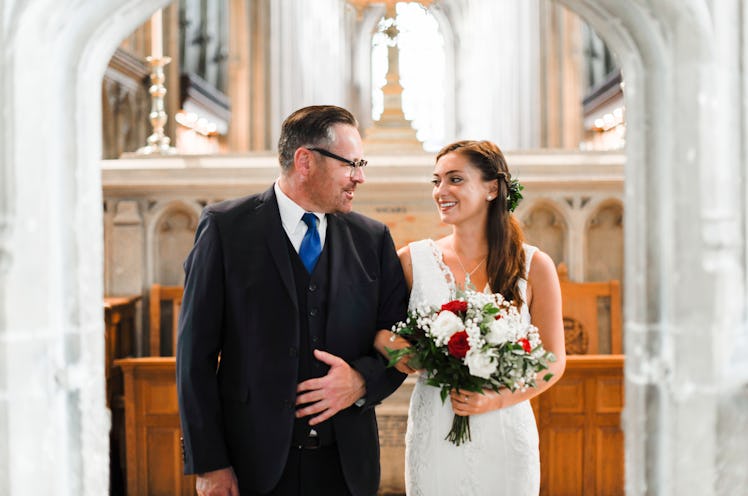
Here’s Why A Bride’s Father Traditionally Walks Them Down The Aisle
Every culture and religion has wedding traditions that are built on their ideas and beliefs. However, regardless of your culture or religion, staying true to yourself while also navigating long-standing wedding traditions can be tough. One such tradition that sparks passionate opinions is a bride's procession down the aisle. If you've ever wondered why a bride’s father walks them down the aisle, the answer might surprise you.
Considering western society is a far cry from what it was when the institution of marriage was first put in place, understanding how the tradition of fathers walking daughters down the aisle came to be, and why it's still upheld by so many brides (despite its patriarchal implications) is telling. For some people, being escorted down the aisle by their father is a meaningful way to transition from being a daughter to being a wife. For others, it's an antiquated practice that objectifies and infantilizes women. As with many traditions, there is no "right" or "wrong" opinion to have. That said, the history behind this age-old practice is fascinating.
According to marriage and relationship expert Sheri Stritof, marriage was (and in some cultures, still is) seen as an "economic liaison." "Some [marriages] involve a dowry (the bride's family giving money or presents to the groom or his family), and some require a bride price (the groom or his family giving money or a present to the bride's family)," wrote Stritof on The Spruce. "Few may have any courtship or dating, but most have deep-rooted traditions." It turns out, the idea of marriage as a financial decision is what led fathers to get involved in the ceremonies.
"A bride was a 'financial liability' who was essentially transferred from the household of her father to that of the groom," wedding historian Susan Waggoner told Brides.com. Back when weddings were essentially business deals between two families, it was believed that the father's presence was necessary for things to run smoothly. "This custom stems from the days of arranged marriages when a father’s looming presence was a good way to prevent the groom from backing out,” explained Waggoner.
Needless to say, many modern women aren't so into the idea of being exchanged from one male "authority" to another. Fortunately, new traditions can oftentimes emerge from older ones. "I hear frequently from [my blog] readers who are equally uncomfortable with the concept of being 'given away,' and they find amazing ways to create their own beautiful traditions," wrote Ariel Meadow, author of Offbeat Bride: Creative Alternatives For Independent Brides in a piece for The New York Times. "Some brides walk down the aisle with both their parents (as is customary in Jewish weddings), others enter and walk together with their partners. I've seen some brides walk down the aisle with a child from a previous relationship, or with a sibling who has supported them."
In the end, weddings are such a personal, intimate event. No matter how much you tiptoe around their feelings, not everyone's dad will love the idea of not walking their child down the aisle, even if it's not in line with the bride's personal belief system. For some people whose fathers have passed away, or weren't involved in their lives in a meaningful way, deciding on an alternative plan for making their way down the aisle might also be challenging. And if you've been looking forward to sharing this special moment with your dad forever, that's great too! What's most important is that your wedding ceremony reflects who you are so you can look back on it with a positive outlook. That's why being honest with yourself about the traditions that are meaningful to you and the ones you'd rather not observe is key.
This article was originally published on